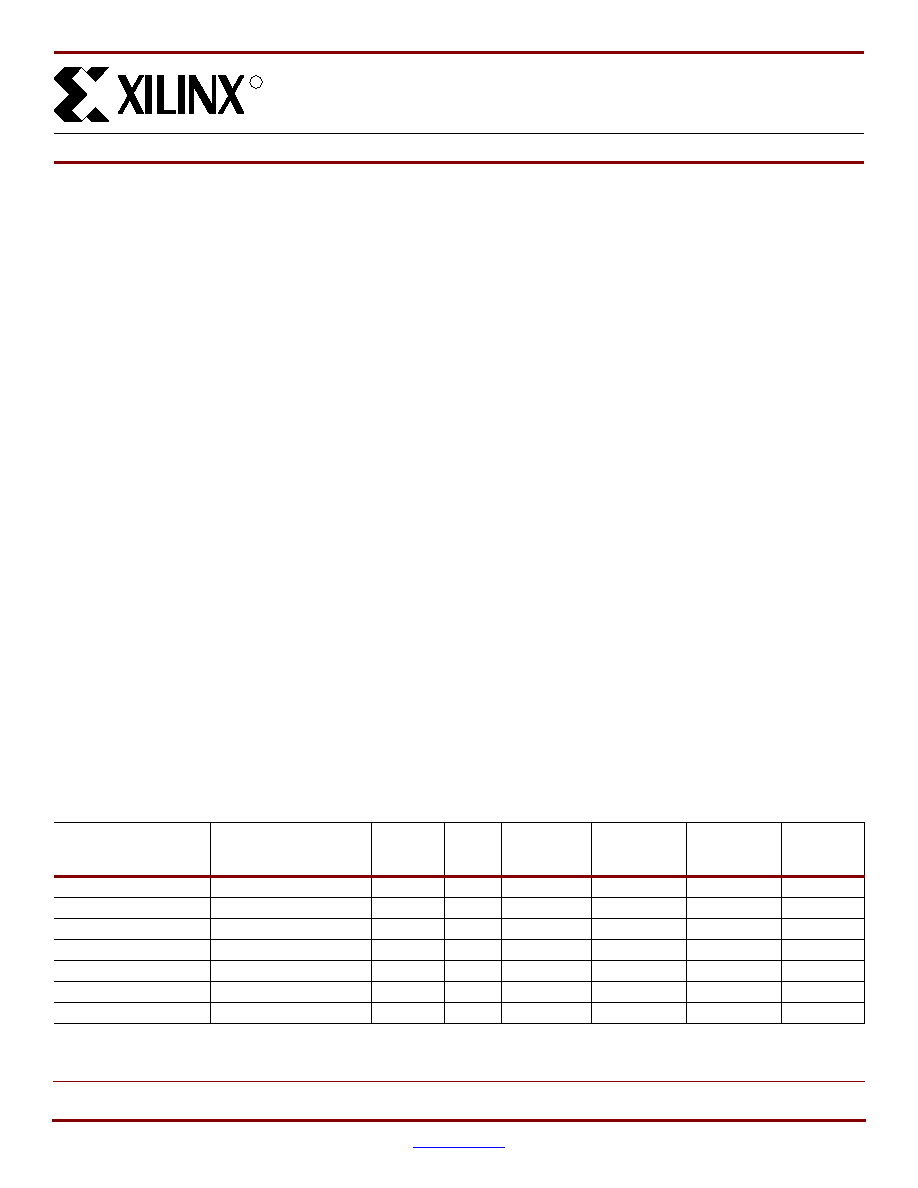- 您現(xiàn)在的位置:買(mǎi)賣(mài)IC網(wǎng) > PDF目錄4283 > XC2S100E-6FTG256C (Xilinx Inc)IC SPARTAN-IIE FPGA 100K 256FBGA PDF資料下載
參數(shù)資料
| 型號(hào): | XC2S100E-6FTG256C |
| 廠商: | Xilinx Inc |
| 文件頁(yè)數(shù): | 32/108頁(yè) |
| 文件大小: | 0K |
| 描述: | IC SPARTAN-IIE FPGA 100K 256FBGA |
| 產(chǎn)品變化通告: | FPGA Family Discontinuation 18/Apr/2011 |
| 標(biāo)準(zhǔn)包裝: | 90 |
| 系列: | Spartan®-IIE |
| LAB/CLB數(shù): | 600 |
| 邏輯元件/單元數(shù): | 2700 |
| RAM 位總計(jì): | 40960 |
| 輸入/輸出數(shù): | 182 |
| 門(mén)數(shù): | 100000 |
| 電源電壓: | 1.71 V ~ 1.89 V |
| 安裝類(lèi)型: | 表面貼裝 |
| 工作溫度: | 0°C ~ 85°C |
| 封裝/外殼: | 256-LBGA |
| 供應(yīng)商設(shè)備封裝: | 256-FTBGA |
| 其它名稱(chēng): | 122-1322 |
第1頁(yè)第2頁(yè)第3頁(yè)第4頁(yè)第5頁(yè)第6頁(yè)第7頁(yè)第8頁(yè)第9頁(yè)第10頁(yè)第11頁(yè)第12頁(yè)第13頁(yè)第14頁(yè)第15頁(yè)第16頁(yè)第17頁(yè)第18頁(yè)第19頁(yè)第20頁(yè)第21頁(yè)第22頁(yè)第23頁(yè)第24頁(yè)第25頁(yè)第26頁(yè)第27頁(yè)第28頁(yè)第29頁(yè)第30頁(yè)第31頁(yè)當(dāng)前第32頁(yè)第33頁(yè)第34頁(yè)第35頁(yè)第36頁(yè)第37頁(yè)第38頁(yè)第39頁(yè)第40頁(yè)第41頁(yè)第42頁(yè)第43頁(yè)第44頁(yè)第45頁(yè)第46頁(yè)第47頁(yè)第48頁(yè)第49頁(yè)第50頁(yè)第51頁(yè)第52頁(yè)第53頁(yè)第54頁(yè)第55頁(yè)第56頁(yè)第57頁(yè)第58頁(yè)第59頁(yè)第60頁(yè)第61頁(yè)第62頁(yè)第63頁(yè)第64頁(yè)第65頁(yè)第66頁(yè)第67頁(yè)第68頁(yè)第69頁(yè)第70頁(yè)第71頁(yè)第72頁(yè)第73頁(yè)第74頁(yè)第75頁(yè)第76頁(yè)第77頁(yè)第78頁(yè)第79頁(yè)第80頁(yè)第81頁(yè)第82頁(yè)第83頁(yè)第84頁(yè)第85頁(yè)第86頁(yè)第87頁(yè)第88頁(yè)第89頁(yè)第90頁(yè)第91頁(yè)第92頁(yè)第93頁(yè)第94頁(yè)第95頁(yè)第96頁(yè)第97頁(yè)第98頁(yè)第99頁(yè)第100頁(yè)第101頁(yè)第102頁(yè)第103頁(yè)第104頁(yè)第105頁(yè)第106頁(yè)第107頁(yè)第108頁(yè)

DS077-1 (v3.0) August 9, 2013
3
Product Specification
2001–2013 Xilinx, Inc. All rights reserved. XILINX, the Xilinx logo, the Brand Window, and other designated brands included herein are trademarks of Xilinx, Inc. All other
trademarks are the property of their respective owners.
— OBSOLETE — OBSOLETE — OBSOLETE — OBSOLETE —
Introduction
The Spartan-IIE Field-Programmable Gate Array family
gives users high performance, abundant logic resources,
and a rich feature set, all at an exceptionally low price. The
seven-member family offers densities ranging from 50,000
to 600,000 system gates, as shown in Table 1. System per-
formance is supported beyond 200 MHz.
Features include block RAM (to 288K bits), distributed RAM
(to 221,184 bits), 19 selectable I/O standards, and four
DLLs (Delay-Locked Loops). Fast, predictable interconnect
means that successive design iterations continue to meet
timing requirements.
The Spartan-IIE family is a superior alternative to
mask-programmed ASICs. The FPGA avoids the initial cost,
lengthy
development
cycles,
and
inherent
risk
of
conventional ASICs. Also, FPGA programmability permits
design upgrades in the field with no hardware replacement
necessary (impossible with ASICs).
Features
Second generation ASIC replacement technology
-
Densities as high as 15,552 logic cells with up to
600,000 system gates
-
Streamlined features based on Virtex-E FPGA
architecture
-
Unlimited in-system reprogrammability
-
Very low cost
-
Cost-effective 0.15 micron technology
System level features
-
SelectRAM hierarchical memory:
16 bits/LUT distributed RAM
Configurable 4K-bit true dual-port block RAM
Fast interfaces to external RAM
-
Fully 3.3V PCI compliant to 64 bits at 66 MHz and
CardBus compliant
-
Low-power segmented routing architecture
-
Dedicated carry logic for high-speed arithmetic
-
Efficient multiplier support
-
Cascade chain for wide-input functions
-
Abundant registers/latches with enable, set, reset
-
Four dedicated DLLs for advanced clock control
Eliminate clock distribution delay
Multiply, divide, or phase shift
-
Four primary low-skew global clock distribution nets
-
IEEE 1149.1 compatible boundary scan logic
Versatile I/O and packaging
-
Pb-free package options
-
Low-cost packages available in all densities
-
Family footprint compatibility in common packages
-
19 high-performance interface standards
LVTTL, LVCMOS, HSTL, SSTL, AGP, CTT, GTL
LVDS and LVPECL differential I/O
-
Up to 205 differential I/O pairs that can be input,
output, or bidirectional
-
Hot swap I/O (CompactPCI friendly)
Core logic powered at 1.8V and I/Os powered at 1.5V,
2.5V, or 3.3V
Fully supported by powerful Xilinx ISE development
system
-
Fully automatic mapping, placement, and routing
-
Integrated with design entry and verification tools
-
Extensive IP library including DSP functions and
soft processors
Spartan-IIE FPGA Family:
Introduction and Ordering
Information
DS077-1 (v3.0) August 9, 2013
0
Product Specification
R
Table 1: Spartan-IIE FPGA Family Members
Device
Logic
Cells
Typical
System Gate Range
(Logic and RAM)
CLB
Array
(R x C)
Total
CLBs
Maximum
Available
User I/O(1)
Maximum
Differential
I/O Pairs
Distributed
RAM Bits
Block RAM
Bits
XC2S50E
1,728
23,000 - 50,000
16 x 24
384
182
83
24,576
32K
XC2S100E
2,700
37,000 - 100,000
20 x 30
600
202
86
38,400
40K
XC2S150E
3,888
52,000 - 150,000
24 x 36
864
265
114
55,296
48K
XC2S200E
5,292
71,000 - 200,000
28 x 42
1,176
289
120
75,264
56K
XC2S300E
6,912
93,000 - 300,000
32 x 48
1,536
329
120
98,304
64K
XC2S400E
10,800
145,000 - 400,000
40 x 60
2,400
410
172
153,600
160K
XC2S600E
15,552
210,000 - 600,000
48 x 72
3,456
514
205
221,184
288K
Notes:
1.
User I/O counts include the four global clock/user input pins. See details in Table 2, page 5
相關(guān)PDF資料 |
PDF描述 |
|---|---|
| ACB91DHFT-S621 | EDGECARD 182POS SMD W/O POST |
| ABB91DHFT-S621 | EDGECARD 182PS .050 SMD W/O POST |
| ACB91DHFT-S578 | EDGECARD 182POS .050 SMD W/POSTS |
| XC2S100E-6FT256C | IC FPGA 1.8V 600 CLB'S 256-FBGA |
| ABB91DHFT-S578 | EDGECARD 182POS .050 SMD W/POSTS |
相關(guān)代理商/技術(shù)參數(shù) |
參數(shù)描述 |
|---|---|
| XC2S100E-6FTG256I | 制造商:XILINX 制造商全稱(chēng):XILINX 功能描述:Spartan-IIE FPGA |
| XC2S100E-6PQ208C | 功能描述:IC FPGA 1.8V 600 CLB'S 208-PQFP RoHS:否 類(lèi)別:集成電路 (IC) >> 嵌入式 - FPGA(現(xiàn)場(chǎng)可編程門(mén)陣列) 系列:Spartan®-IIE 標(biāo)準(zhǔn)包裝:40 系列:Spartan® 6 LX LAB/CLB數(shù):3411 邏輯元件/單元數(shù):43661 RAM 位總計(jì):2138112 輸入/輸出數(shù):358 門(mén)數(shù):- 電源電壓:1.14 V ~ 1.26 V 安裝類(lèi)型:表面貼裝 工作溫度:-40°C ~ 100°C 封裝/外殼:676-BGA 供應(yīng)商設(shè)備封裝:676-FBGA(27x27) |
| XC2S100E-6PQ208I | 制造商:XILINX 制造商全稱(chēng):XILINX 功能描述:Spartan-IIE FPGA |
| XC2S100E-6PQG208C | 功能描述:IC FPGA 1.8V 600 CLB'S 208-PQFP RoHS:是 類(lèi)別:集成電路 (IC) >> 嵌入式 - FPGA(現(xiàn)場(chǎng)可編程門(mén)陣列) 系列:Spartan®-IIE 標(biāo)準(zhǔn)包裝:40 系列:Spartan® 6 LX LAB/CLB數(shù):3411 邏輯元件/單元數(shù):43661 RAM 位總計(jì):2138112 輸入/輸出數(shù):358 門(mén)數(shù):- 電源電壓:1.14 V ~ 1.26 V 安裝類(lèi)型:表面貼裝 工作溫度:-40°C ~ 100°C 封裝/外殼:676-BGA 供應(yīng)商設(shè)備封裝:676-FBGA(27x27) |
| XC2S100E-6PQG208I | 制造商:XILINX 制造商全稱(chēng):XILINX 功能描述:Spartan-IIE FPGA |
發(fā)布緊急采購(gòu),3分鐘左右您將得到回復(fù)。